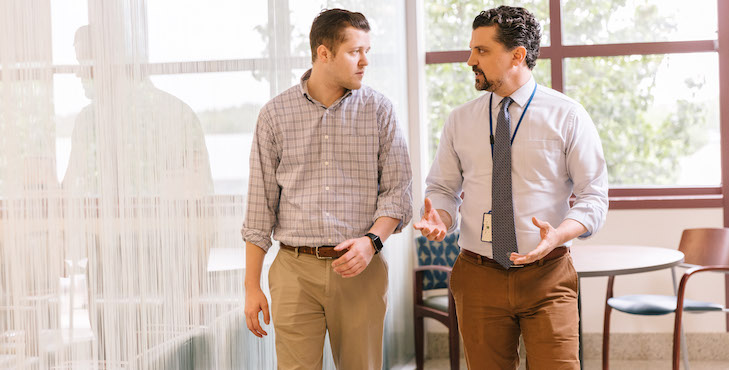So, you reached out to a VA Careers recruiter about a job opportunity and asked them to review your resume — smart move! But now it’s been a few days and you haven’t heard back. What’s a job seeker to do?
No need to worry. There are many reasons why a recruiter hasn’t reached out yet. Sometimes, there isn’t much to report — the application is still making its way to the proper personnel. Other times, the recruiter is sifting through many resumes, making it hard to respond to all applicants immediately.
Still, sending a follow-up email to a recruiter can be an effective way to stand out from the crowd. Here are five times when you can make a connection:
-
Directly following a meeting or interview.
Capitalize on a strong interview by sending the recruiter an email within a few hours. Between a recruiter’s phone screenings, interviews and travel time, sending an email makes it more convenient for them to respond quickly, and it documents the process.
Pro tip: When you’re following up, make sure your message is short and includes your contact info. Along with thanking the recruiter for their time, you can share information you might’ve forgotten during your conversation or wanted to elaborate on.
-
After you’ve connected on LinkedIn.
If you’ve recently reached out to a recruiter on LinkedIn (or vice versa), sharing an industry article on the job you’re seeking or commenting on a shared interest that came up during your conversation can help keep your name and resume at the forefront.
-
When you haven’t heard back.
Busy weeks happen to the best of us! But no matter the reason, if a recruiter said they’d be in touch by a date that has now passed, feel free to send a follow-up email. If no specific day or time was mentioned, waiting a week or two to drop them a line is a good rule of thumb.
-
When you receive good news.
You got the job! A message thanking the recruiter for their support in your job search is the type of follow up they love to receive.
-
When you don’t receive good news.
This might be the toughest message to send, but it’s a great opportunity to ask for feedback while demonstrating that you can handle rejection with grace. After all, a new opportunity could be right around the corner.
Choose VA today and #ApplyYourself
Ready to choose VA for your career? Take a closer look at what we offer and apply today.
- LEARN more about the VA hiring process and the benefits of a VA career.
- SEND questions to the virtual recruiting center here.
- STAY in touch via Facebook, Twitter, Instagram, LinkedIn and Glassdoor.
- SEARCH VA careers at www.VAcareers.va.gov.
Topics in this story
More Stories
Nearly 400 Veterans from across the country have gathered in Snowmass Village for the 39th Annual National Disabled Veterans Winter Sports Clinic. This premier adaptive rehabilitation event, co-presented by VA and Disabled American Veterans (DAV), continues through April 5.
Whether it’s access to the great outdoors or a calmer pace in your everyday life, you can find it in rural VA communities around the country.
VA and the Veterans Day National Committee (VDNC) invites cities, towns, and non-profit groups across the country to join us in showing appreciation for Veterans by applying to hold VA-recognized regional Veterans Day observances.






Hi! Could you tell me the difference between a medical disqualification and being physically unfit? Thanks.
Physically unfit: not proper, suitable, or acceptable, not having the necessary qualities, skills to do something, not physically healthy : not in good physical condition.
Medical disqualified: means that you currently have a disqualifying medical condition due to not being healthy, (high or low blood pressure, heart, organs, and blood problems or mental health.)